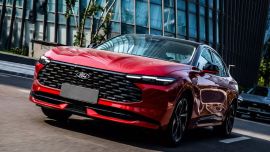Jair Bolsonaro certainly isn't hiding his animosity towards Alberto Fernández. The Brazilian president spent months criticising the president-elect during Argentina's election campaign, slamming Peronists and threatening to sever Argentina’s ties with the Mercosur trade bloc. He even refused to congratulate Alberto Fernández on his victory on October 27.
On Wednesday, Bolsonaro made another couple of controversial moves. In an explosive tweet that quickly dominated headlines on both sides of the border, the outspoken leader claimed that three multinational companies would close their factories in Argentina and move to Brazil. The tweet, which didn’t exactly line up with the truth in two of the three cases, was finally deleted hours later.
“MWM, a US-based car factory; Honda, the automobile giant; and L’Oreal announced the closure of their factories in Argentina and their placement instead in Brazil. The new trust of the investor will generate jobs and greater economic activity in our country,” wrote Bolsonaro. Yet two hours after, he erased the message and he hasn’t returned to mention the topic or provided any explanations about it since.
In reality, North American company Navistar announced last September it would shut its MWM motor factory located in the town of Jesús María in Cordoba. “All the necessary backing for MWM products in Mercosur right now will be provided through its operations in Brazil with a focus on the network of local services in Argentina, technical assistance and the distribution of parts,” the company said in a statement at that time.
Just days after Argentina's PASO primary vote in August, the Japanese automobile company Honda announced it would cease the production of cars in Argentina at the start of 2020. At the time, leadership said it corresponded with a shift in strategy within the region and a new focus on motorcycle production by the beginning of 2020, a strategy reaffirmed by Seiji Saito, president of Honda Argentina, on Wednesday. In fact, the plant in Campana, a locality within Buenos Aires Province, required a US$15 million investment.
Saito confirmed yesterday the company had no plans to leave Argentina. “We aren’t in a situation to give comment, but what’s important is to highlight what’s real rather than what’s fake news. What’s true is that we are staying in Argentina as we announced in August,” he said.
“The Argentine market always has ups and downs. At Honda, we’re always innovating new products, cars as well as other modes of transportation, that are reliable beyond what happens in the market, which is impossible to predict,” he added in his statement.
For its part, L’Oreal sent a communication in which it highlighted changes in respect to its positions in Argentina. “L’Oreal produces in Argentina nearly 40 million units per year in partnership with a local producer. There is no plan to change this, in fact our ambition is to continue to grow local production,” it read. “Argentina is a strategic market for L’Oreal and the company is committed to accompanying the economic growth in the country.”
Longstanding and escalating tensions
For months, Bolsonaro has engaged in verbal confrontations with Fernández, mostly centred on ideological questions. Even before Fernández was elected, the far-right Brazilian leader hailed Mauricio Macri for ending the “Dilma Kirchner” show and then said an eventual win of Cristina Fernández de Kirchner would turn the country into “Venezuela of the South.”
The Frente de Todos president-elect, for his part, visited Luiz Inácio Lula Da Silva, a fierce opponent of Bolsonaro, in prison during campaigning and called for the former Brazil president's liberation during his acceptance speech.
Bolsonaro has also floated the idea of suspending Argentina from Mercosur, saying a Peronist victory would “create problems.”
“I don’t think they want to follow the principles of liberty and democracy,” he said after the PASO.
The warning falls along the lines of the pro-market economic ideals of Bolsonaro and his economy minister, Paulo Guedes. Both want to use the regional bloc to sign sweeping free-trade agreements with the United States and the European Union.
Tensions rose last week when Bolsonaro once again lamented the victory of Fernández, saying Argentina had “chosen wrong.” The statements created problems for Macri’s outgoing government, whose foreign minister had to call for the Brazilian leader to moderate his opinions.
And the most recent escalation, however, came only hours after Bolsonaro deleted his tweets. He announced last week he himself wouldn’t be attending Fernández inauguration next month, instead saying his vice-president Hamilton Mourao would go in his place. According to reports, the controversialist is now seeking to downgrade representation even further, with perhaps now a cabinet minister attending in both of their stead.
On Wednesday, sources from within Bolsonaro’s Cabinet told Perfíl that the possibility of sending a minister hadn’t been discussed. The source also dismissed the idea that a minister who would represent Brazil.
In the Foreign Ministry, however, with just over a month before the inauguration, it’s still unknown if anyone government representative from Brazil will even attend and, if so, who that person will be.
Tensions will likely escalate further this weekend when the so-called "Grupo de Puebla" meets in Buenos Aires. This progressive axis, organised by Fernández and other aligned regional leaders, has been proposed as an alternative to the Lima Group, the organisation that holds a firm position against the regime of Nicolás Maduro in Venezuela.
– PERFIL/TIMES



















Comments